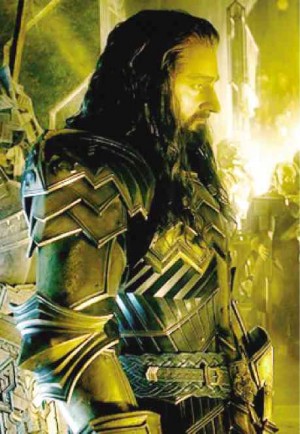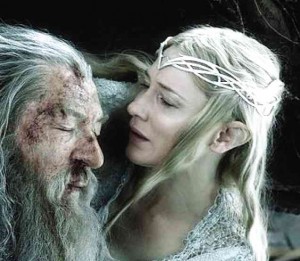‘Hobbit’ movies end with poignant finality
The final part of the “Lord of the Rings” prequel series “The Hobbit,” directed by Peter Jackson, gives a fine ending to the fantasy saga, despite unavoidable comparisons with the more spectacular trilogy that preceded it.
“The Battle of the Five Armies” brings to a close this epic sojourn to Middle-earth, a realm threatened by various conflicts between races, as well as by monstrous forces seeking conquest. Surviving them is the hobbit burglar, Bilbo Baggins (Martin Freeman), who has fought and fled from such dangers alongside staunch allies, in two previous films.
A year after the cliffhanger of “The Desolation of Smaug,” the fate of the heroic band of adventurers is finally revealed. The titular dragon Smaug (voiced by Benedict Cumberbatch) gets to unleash chaos on the world, cutting a fiery swath across a town in a neighboring territory.
A land dispute is introduced, as the dragon’s treasure-filled mountain castle is reclaimed by the dwarves, led by the now-ensorcelled Thorin (Richard Armitage). The elves, led by Thranduil (Lee Pace), seek a relic belonging to his people, ready to storm Thorin’s stronghold if a peaceful solution is refused.
Monstrous forces
Bent on their destruction, however, is the bloodthirsty Azog the Defiler (Manu Bennett), who is marshalling his monster forces—orcs, trolls, giant bats, etc.—and commands a multitude of minions that may just crush both formidable armies in one calculated attack.
“The Battle of the Five Armies” is truly epic in that regard; the special effects give glorious life to the fantastical; after Smaug’s convincing display of might, the various goings-on on the battlefield are just as awe-inspiringly real.
The prolonged one-on-one duels, however, can inspire impatience, despite being impressively choreographed and rendered. Still, they’re not a drawback, as there are lengthy battle scenes that often switch to other elaborate sequences.

Enchanted dwarf leader Thorin (played by Richard Armitage) starts tension with the elves, led by Thranduil (played by Lee Pace).
And yes, as for the unavoidable “Return of the King” comparison, this part ends the “Hobbit” series in grand fashion, but it’s not as thrilling as the “Lord of the Rings” conclusion—and it doesn’t have to be.
If one was hoping for a scene similar to the “Eowyn moment”—she boldly defeated that mighty Witch-King in battle—there’s a brief declaration of Middle-earthen woman power by the nondescript females of this installment, apart from Galadriel’s (Cate Blanchett) short but explosive fight scene.
Worthy prequels
“Five Armies” has its share of decidedly pyrrhic victories, keeping it from being a thoroughly feel-good conclusion. Still, this is a defining chapter for many of the characters in the “Hobbit” series, giving this worthy prequel films its own memorable figures and clashes.
And “Five Armies” is accessible in that it offers interesting parallels to real-life struggles, from the “interracial” attraction between the elf archer Tauriel (Evangeline Lilly) and the dwarf Kili (Aiden Turner), to the territorial dispute initiated by Thorin.
Coming full circle, the series is bookended by a scene that connects to the first lauded “Rings” trilogy, reiterating the poignant finality of this much-appreciated saga.
